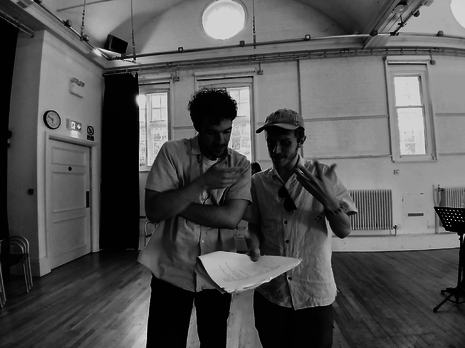MESSIAH: in conversation with Aisling Towl
Daphne Stavride sits down with Trinity College’s playwright-in-residence to discuss her upcoming play, MESSIAH

Playwriting is an undeniably captivating craft that has fascinated both literary and theatre enthusiasts for centuries. As a theatre fanatic myself, I’ve always been intrigued by the correspondence between the playwright and the oh-so-frightening blank page, which lead me to a truly insightful conversation with the current Shaffer playwright-in-residence at Trinity College, Aisling Towl. I sat down with Aisling amidst the subtle Saturday buzz of Waterstones cafe to discuss her creative process and reflect upon her upcoming play, MESSIAH.
Cambridge’s rich, historic charm, and scenic beauty has long inspired creative minds to flourish, so I was curious to hear from Aisling about how working in Cambridge has shaped her own writing. She explains that MESSIAH has been under six months of rapid development, a condensed time frame which she says has affected the style of the play: “It’s quick and chaotic, maybe deliberately disorientating”. Aisling mentions being influenced by the turbulent international political developments of the past six months, stating that the play is “set in Britain but set nowhere. I was thinking about alternative politicians, their personality and how fringe political movements become more mainstream.”
“I often start with a question that I can’t stop asking myself or the world, and one I can’t find an answer to”
Conscious of the ever-evolving formal and structural range of contemporary playwriting, I was curious as to Aisling’s individual approach to dramatic structure. “I often start with a question that I can’t stop asking myself or the world, and one I can’t find an answer to.” She mentions a distinctive aspect of her process: “I usually start with writing rapid dialogue in sort of a trance state for several hours and then assign characters”. She mentions that her main influence for MESSIAH was Enron by Lucy Prebble, alongside works by writers such as Sam Holcroft, Laura Wade, and Lucy Kirkwood. Briefly touching on the historical phenomenon of female playwrights’ work being confined to studios, Aisling emphasises that “I wanted to write a big play, one that couldn’t be performed in a studio space. This residency gave me the time and freedom to think on a bigger scale.”
While Aisling finds that she is constantly returning to themes of power and gender in her writing, she remarks that “my plays are narrative and character driven plays more than anything. I am drawn to writing protagonists that are outsiders.” This is particularly relevant in MESSIAH as she mentions that a lot of the play is set in domestic spheres: “the play is about how those interpersonal social connections do inform political and public life, showing how political decisions are often made in living rooms.” Aisling captures a significant aspect of what I believe compels us as audiences: what goes on behind closed doors and how we navigate the socio-political complexities of contemporary society.
“It is important to remember that every audience member has a different experience of the play, no one is coming in neutral”
When discussing her collaboration with director James Critchley and the often tricky process of transferring a play from page to stage, she mentions that: “I personally don’t want to be overbearing, it’s quite a delicate balance to strike. The very beginning and very end I think is a good time for me to be there. I usually sit back with a cup of tea and not say too much, but I want to be helpful especially if actors have questions regarding the writing. It’s so much fun to be in the rehearsal room and it’s a privilege for people to be thinking deeply about my work.”
Reflecting on the trials of the playwriting process, I asked Aisling what she considers a personal difficulty. She answers, “balancing politics with dramaturgy in a form that relies on craft and a set of cultural expectations based on western models of dramaturgy.” She raises a significant point on the uncontrollable relation between playwright intention and audience reception: “it is important to remember that every audience member has a different experience of the play, no one is coming in neutral.”
Finally, I ask Aisling if she has any show week rituals. She giggles. “I’m usually a nightmare in show week, I just sit in the back and don’t talk to anyone. But we did have a fun pre-show ritual when I was in youth theatre: we’d smash a Tunnock’s Teacake against our forehead so it would become a kind of flat marshmallow biscuit, eat it, and then we’d do the show!”
Aisling also mentions her upcoming project following MESSIAH: a new play called Gentlemen of the Jury, in collaboration with AKRO Theatre. She describes it as an “experiment in democracy,” a play about the “recriminalisation of abortion and criminal inertia, set in a civic building and put on in a civic building.” Gentlemen of the Jury will be performed on the 27th-29th of June at the Cambridge Guildhall, mark your calendars!
But first, make sure to catch the astute political drama MESSIAH at our very own ADC Theatre. It promises to be criminally good.
Messiah is showing at the ADC Theatre from Tuesday 20th to Saturday 24th May at 7:30 pm.
Want to share your thoughts on this article? Send us a letter to letters@varsity.co.uk or by using this form.
 News / Judge Business School advisor resigns over Epstein and Andrew links18 February 2026
News / Judge Business School advisor resigns over Epstein and Andrew links18 February 2026 News / Gov grants £36m to Cambridge supercomputer17 February 2026
News / Gov grants £36m to Cambridge supercomputer17 February 2026 News / Union speakers condemn ‘hateful’ Katie Hopkins speech14 February 2026
News / Union speakers condemn ‘hateful’ Katie Hopkins speech14 February 2026 News / CUCA members attend Reform rally in London20 February 2026
News / CUCA members attend Reform rally in London20 February 2026 News / Right-wing billionaire Peter Thiel gives ‘antichrist’ lecture in Cambridge6 February 2026
News / Right-wing billionaire Peter Thiel gives ‘antichrist’ lecture in Cambridge6 February 2026










